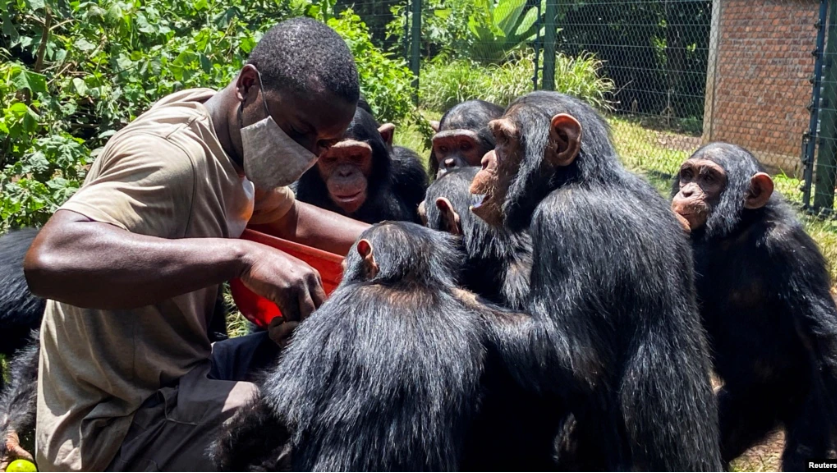A new arrival to the Lwiro Primates Rehabilitation Center gives a brief hug to his human rescuer. Then, the young chimpanzee is gone — off to play, in a much securer home than his last.
Conservation workers in the Democratic Republic of Congo recently removed the wild animal from illegal captivity. The team travelled hundreds of kilometers with the chimp to the center. It is a protected place, or sanctuary, for primates separated from their parents.
The center opened about 20 years ago in the Congolese village of Lwiro. There are more than 100 chimpanzees at the sanctuary today.
Democratic Republic of Congo and neighboring Congo Republic are home to the largest number of great apes in Africa.
But most great ape populations are decreasing from forest loss, hunting and trafficking, says a recent report from the Great Apes Survival Partnership (GRASP).
Illegal hunters, or poachers, seek young primates to sell to zoos or individuals. The poachers often kill a whole chimpanzee family to capture one young member, conservationists say.
Itsaso Velez del Burgo is the Lwiro center’s director.
“It’s horrible because the year 2021 was the worst year in the history of our center, we had 15 arrivals,” she said. She added, “And you have to think that for every chimpanzee that arrives here at the sanctuary, there are ten more that died in the forest….The situation is serious. If we don’t act to protect the forest, soon it will be empty.”
The United Nations says that poachers can sell a live chimpanzee for $50 to $100. But, later the animals can be marketed again at far higher prices.
In eastern Congo, violence has made it hard to release the apes back into the wild, in a process known as reintegration. Reintegration is the sanctuary’s goal, Claude-Sylvestre Libaku, manager of the center, said.
“There are already groups (of apes) that are ready to be reintegrated, but the presence of armed groups in the forest is blocking us,” Libaku said.
There has been a resurgence of some armed groups in Eastern Congo in recent years, leading the government to declare martial law in parts of the east.
Although there is no evidence that the illegal trade in great apes is linked to armed groups, their presence in the forest still presents a threat, said Johannes Refisch of the United Nations-led GRASP.
“I would agree that (the apes) are more at risk when there are more guns around,” he said. “There is a higher risk for wild meat hunting, and even in areas where great apes are not targeted, hunters might bump into a gorilla and kill the animals because they feel threatened.”
I’m John Russell.
Djaffar Al Katanty reported on this story for Reuters. John Russell adapted it for VOA Learning English.
____________________________________________________________________
Words in This Story
primate – n. any member of the group of animals that includes human beings, apes, and monkeys
conservationist – n. someone who works to protect animals, plants, and natural resources
bump into – phrasal verb to meet (someone) by chance; to see someone you did not expect to see
